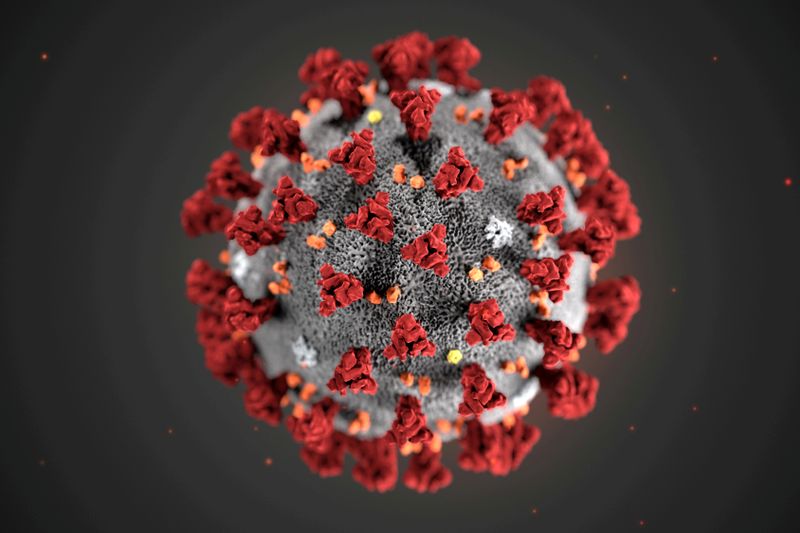By Nancy Lapid
(Reuters) - The following is a roundup of some of the latest scientific studies on the novel coronavirus and efforts to find treatments and vaccines for COVID-19, the illness caused by the virus.
Plasma treatment shows no benefit in severe COVID-19
Blood plasma from COVID-19 survivors was of little benefit to patients with severe COVID-19 pneumonia, researchers in Argentina reported on Tuesday in The New England Journal of Medicine. So-called convalescent plasma, which delivers COVID-19 survivors' antibodies to infected people, did not improve critically ill patients' health status or reduce their risk of dying from the disease any better than a placebo. Researchers randomly assigned 333 hospitalized patients with severe COVID-19 pneumonia to receive convalescent plasma or a placebo. After 30 days, they saw no significant differences in patients' symptoms or health. Mortality rates were nearly the same: 11% in the convalescent plasma group and 11.4% in the placebo group, a difference not deemed statistically significant. It is still possible that convalescent plasma might help less-sick patients who get the treatment earlier in their illness, said study leader Dr. Ventura Simonovich of the Hospital Italiano de Buenos Aires. A separate randomized trial from Argentina, posted on Saturday on medRxiv ahead of peer review, found that when elderly COVID-19 patients received convalescent plasma within 72 hours after their symptoms began instead of a placebo, they were significantly less likely to become severely ill. (https:// https:// https://reut.rs/3fFPJ8D)
COVID-19 may hurt male fertility
Evidence of testes damage from COVID-19 has been accumulating in a series of small autopsy studies, suggesting that the new coronavirus could have an impact on male fertility. Researchers from the University of Miami in Florida compared testis tissues from six men who died of COVID-19 and three who died of other causes. Three of the COVID-19 patients had testis damage that would impair their ability to produce sperm. A Chinese research team made similar observations earlier this year and also found that some COVID-19 patients' immune systems "attacked" the testes, causing severe inflammation, or orchitis. A separate Chinese team found "significant damage" to the basic cellular tissue of the testicles in 12 men who died of COVID-19. "The possibility that COVID-19 damages the testes and impacts fertility ... warrants gonadal function evaluation in men infected with COVID-19, or who have recovered from COVID-19, and desire fertility," the Miami team concluded in a report published in the World Journal of Men's Health. (https:// https:// https://
Mutations do not appear to help coronavirus spread faster
The novel coronavirus is picking up genetic changes as it spreads around the world, but the mutations currently documented do not appear to help it spread faster, scientists said on Wednesday in the journal Nature Communications. Using a global dataset of virus genomes from 46,723 people with COVID-19 from 99 countries, researchers identified more than 12,700 mutations in the genetic material of the virus. Of those, the scientists focused on 185 mutations that they found had occurred at least three times independently during the course of the pandemic. "Fortunately, we found that none of these mutations are making COVID-19 spread more rapidly," said coauthor Lucy van Dorp of University College London's Genetics Institute. Other experts, however, have suggested that one mutation, known as D614G, did increase transmissibility of the virus. Francois Balloux, a UCL professor who worked on the study, said that its findings, for now, posed no threat to COVID-19 vaccine efficacy. "The virus may well acquire vaccine-escape mutations in the future, but we're confident we'll be able to flag them up promptly, which would allow updating the vaccines in time if required," he said. (https://go.nature.com/2JgkNQ0; https://reut.rs/3pZFtgj)
Most Americans still lack COVID-19 antibodies
As of September, the vast majority of U.S. residents still had not been exposed to the new coronavirus, antibody test results suggest. In all 50 states, the District of Columbia and Puerto Rico, researchers looked for COVID-19 antibodies in nearly 178,000 blood samples collected between July and September from patients undergoing tests for non-coronavirus-related reasons. In all but a few states, antibody levels suggested that less than 10% of the population had been infected with or recovered from COVID-19. The highest prevalence of COVID-19 antibodies was in New York - the early epicenter of the U.S. outbreak - where about 25% of blood samples were positive by mid-August. In some states, the proportion of people with COVID-19 antibodies appeared to be below 1%. So-called seroprevalence rates tended to wane over time, researchers found, although they rose in some states, including Georgia and Minnesota. In a report published on Tuesday in JAMA Internal Medicine, the researchers said more work is needed to know whether and how the presence of antibodies affect people's vulnerability to COVID-19 reinfection. (https:// https://
Open https://tmsnrt.rs/3a5EyDh in an external browser for a Reuters graphic on vaccines and treatments in development.
